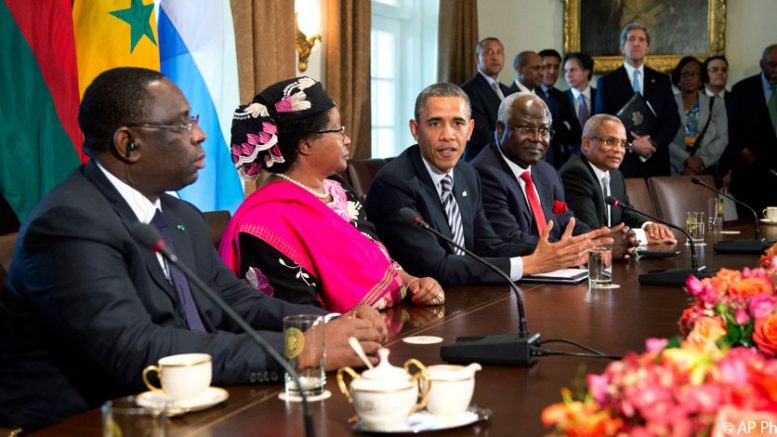Barack Hussein Obama made headlines in 2008 when he became the first black president – or the first Kenyan-American president – of the United States. As the son of a Kenyan father, his election was widely celebrated across Africa. Eight years on, opinions remain divided on his legacy in Africa.
In terms of symbolic value, Barack Obama cannot be faulted.
His victory was hailed as proof that the US had turned its back on a past of slavery and segregation.
Beyond America’s borders, expectations were also high.
“When Barack Obama was elected, I told myself not to expect too much, the disappointment was going to be certain,” Douglas Yates, a professor at the American Graduate School in Paris, told RFI by phone on Monday.
“But it’s true, I always believed that he would end up doing something amazing with Africa, because it was so obvious as the son of a Kenyan, as the first African-American president that he could go there with tremendous legitimacy.”
Obama waited seven years before visiting his father’s homeland in 2015.
He was also criticised for not visiting the continent more often.
When he did, it was to countries that rights groups criticised as being autocratic.
As in 2015, when he visited Ethiopia, and met Prime Minister Hailemariam Desalegn, just a month after the governing party and its allies won 100 percent of seats in parliament.
“My expectation was that he was going to do more for democracy building,” continues Yates. “I’m still waiting.”
US considerations undermined role in Africa
Yates blames this seeming inability to reshape the continent’s politics on self-denial.
“He downplayed his African heritage,” he comments. “Obama didn’t want to be perceived in the US domestically as a black man. A lot of the things he did domestically, he wouldn’t have been able to do if he was perceived as someone who was a Third World president.”
Obama missed out on visiting his father’s hometown during his widely anticipated “homecoming” visit in 2015, arguing that he had a world entrepreneurship summit to attend to instead.
“I can only lament the fact the relationship between Kenya and the US hasn’t been as good or productive as it could have been,” Nairobi lawyer Philip Murgor told RFI by phone.
“I don’t think that’s any fault on Obama’s part, I don’t think the Kenya leadership has taken full advantage of obviously what is a blood relationship. That being said, relations have improved in the last year and we all look forward to a Clinton win to build on this relationship.”
Financial assistance declined
That relationship has been defined by Obama’s signature policy: Power Africa, a plan to help electrify the continent, which he launched in Cape Town in 2013.
There have also been initiatives such as Trade Africa to boost trade between the continent and the US.
But critics regret that direct financial assistance, which dramatically increased during president George Bush’s time in office, has fallen off.
Obama’s “trade not aid” approach means that a country like Afghanistan actually receives more funding from the US than the whole of sub-Saharan Africa put together.
Obama popular with young Africans
Disappointment although there may be, but if you ask a lot of Africans, especially young Africans, they will tell you they love Obama.
“I would say that the most important legacy for Barack Obama in Africa would be his heart … and passion for raising the next generation of African leaders,” Arsène Tungali, a civil society activist in the Democratic Republic of Congo, told RFI by phone.
Tunglai is one of 500 young people chosen to go to Washington as part of the US’s Young African Leaders Initiative (Yali), because of his work in providing education opportunities to children affected by conflict in eastern DR Congo.
“I felt great just being in the same room, I mean we were over 500 people and I think everyone would have loved to shake his hand or meet him in person. I could see him, he was standing like two or three metres away from me and that, that was a great, great experience.”
What has Yali done for him?
“It’s given me confidence and great networking opportunities,” he said. “When you’re selected from a pool of over 40,000 applicants, because of your involvement in the community or your leadership skills, it’s a huge recognition.
“Whenever I’m stuck, I can contact a member of Yali in Nigeria, South Sudan or wherever, and see what challenges African leaders in other countries are facing, so I can make improvements and incorporate them into my own work.”
What has he learnt from Obama?
“Challenges will always be there, but you need to face challenges in a different way, so that you can keep on going and doing what you’re best at.”

